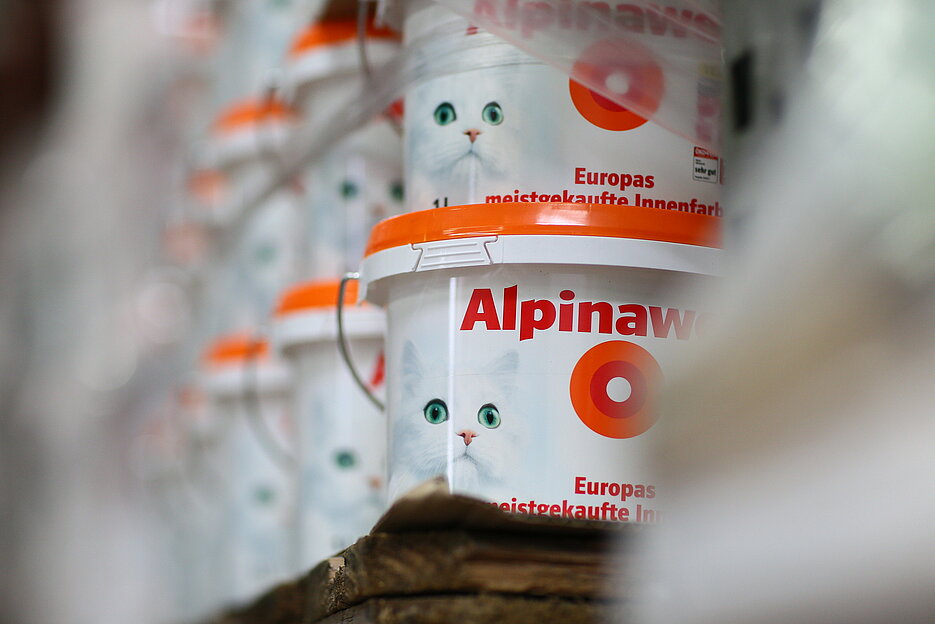Press release: Supporting a "Hidden Champion"
21.07.2015The Chair of Logistics and Quantitative Methods and the DAW SE group, a leading vendor of coating systems in Europe, have launched a joint research project. Its goal is to optimise the group's strategic production and logistics activities.
Everyone who has ever shopped in a hardware store will know the paint buckets bearing the characteristic Alpina label. Caparol products in contrast are intended more for professional users. The brand with the elephant is, however, also known among ordinary persons after the Brandenburg Gate, the Olympic arena in Beijing called "bird's nest" or just recently the Städel Museum in Frankfurt were painted with products from the Odenwald-based company. The DAW SE group combines a total of eight brands under its umbrella, making the family-run business a leading manufacturer of coating products (paints, varnishes, insulation systems and comparable products) in Europe. The DAW SE headquarters are located in Ober-Ramstadt in the Odenwald; worldwide the group has a staff of some 5,600 employees, 3,500 of them in Germany.
Professor Richard Pibernik, head of the Chair of Logistics and Quantitative Methods in Business Administration at the University of Würzburg, has already worked together with the supply chain team of DAW SE since early this year. This collaboration has led to an actual research and development project: Pibernik and his co-worker Konstantin Kloos support the DAW in the development and deployment of a novel procedure for the strategic design of their production and logistics network.
A special challenge for logistics
The colourful product line presents special challenges to the Würzburg scientists in this context: "DAW maintains a complex system of powerful brands for different distribution channels, a wide and rather heterogeneous product line and various production technologies," says Konstantin Kloos. Insulation materials, for instance, are lightweight but voluminous, whereas paints, although heavy, come in rather small containers. In addition, DAW not only supplies hardware stores, but also specialist dealers, painting firms or large construction sites.
So their logistics are accordingly complex – particularly since each of the eight brands is marketed separately for individual public perception. This raises numerous questions for research that go beyond classic 'optimisation projects' in logistics," says Richard Pibernik. For example, the question how a production and logistics network can be ensured while guaranteeing brand integrity and identity.
DAW – a Hidden Champion
The DAW group is known for its powerful brands and innovative products. In 2012, DAW won the "Hidden Champion" award presented by television news channel n-tv. "Our claim to be leading in innovations is not limited to product innovations; rather it includes innovative seminal concepts in the field of customer service, logistics and production," says Daniel Weber, member of the DAW group's management board and Managing Supply Chain Director. "We consider the results from the project with the University of Würzburg to be a major building block for the future strategic direction of our European supply chain," Weber further.
The team of the Department of Logistics and Quantitative Methods in Business Administration brings vast experience in these strategic issues to the table. Pibernik together with global partners from science and companies (among others from the MIT, Bell Labs and Alcatel-Lucent) has dealt with the global design of production and logistics networks for the last three years. "It's fun and it's exciting to make these experiences usable for a German family-run business with strong regional roots," Pibernik says.
Konstantin Kloos also contributes his experiences to the project. He has a comprehensive knowledge of theoretic network optimisation models and already participated in international production and logistics projects in various companies.
Results valuable for teaching
Students in particular are to benefit from the intensive cooperation between DAW and the University of Würzburg. In addition to arranging company contacts for students, Pibernik and Kloos plan to generate innovative curricula for lectures and seminars from the project. "We want to provide a slimmed-down version of the results and models of this research projects to our students for practising," Kloos says. In this way, the future business economists will learn both the quantitative basics and actual management issues using interactive methods and "real" software.
You can download the full article here.
Please find the German version of this Article here.
Contact
Prof. Dr. Richard Pibernik, Chair of Logistics and Quantitative Methods in Business Administration, Phone: +49 931 31-86969, richard.pibernik@uni-wuerzburg.de
Konstantin Kloos, M.Sc., Phone: +49 931 31-88929, konstantin.kloos@uni-wuerzburg.de
Zurück



